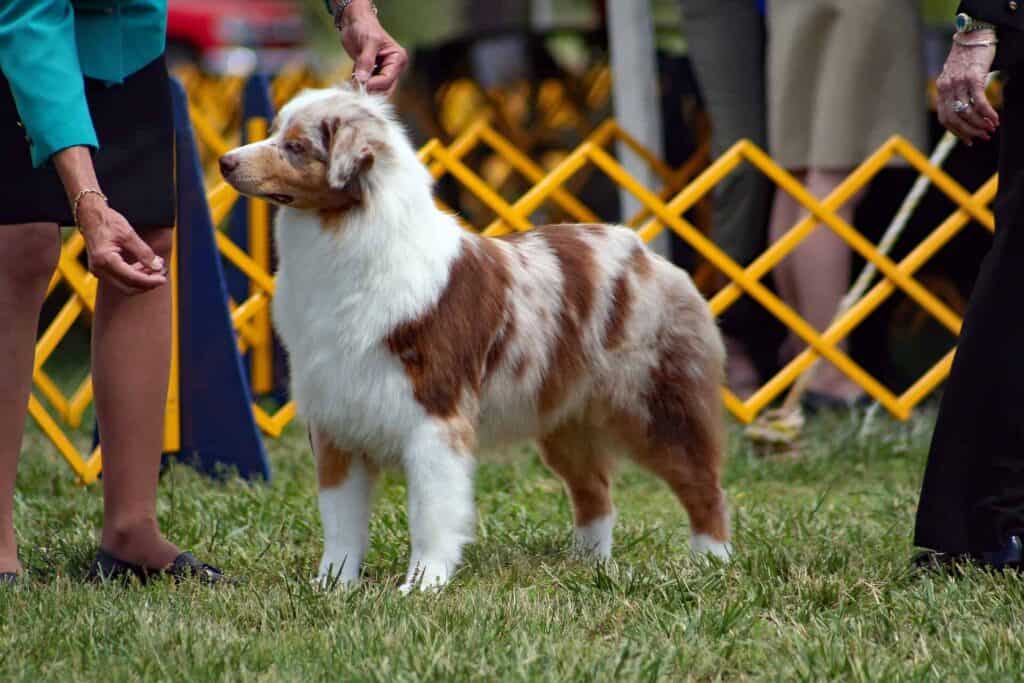10 Critical Questions to Ask Before Buying a Dog From a Breeder

Are you considering expanding your family with a loyal, four-legged companion? Choosing a reputable breeder is a significant first step in ensuring your future pet is healthy, happy, and a perfect match for your lifestyle. Imagine the peace of mind you’ll have, knowing your new furry friend comes from an ethical and caring environment, ready to bring joy and companionship into your home. To guide you toward this rewarding decision, I’ve compiled a comprehensive list of critical questions you should ask before buying a dog from a breeder. Dive into this post to gain the knowledge necessary to make the best choice for you and your future canine pal. Let’s embark on this exciting journey together – your ideal dog awaits!
Questions to Ask Before Buying a Dog From a Breeder
When you first connect with a dog breeder, whether it’s through email, messaging, or a phone call, it’s the opportune moment to ask pivotal questions to ensure you buy a puppy that will perfectly fit your life.
- Is the dog’s pedigree available?
- Does the breeder show or work their dogs in dog sports?
- What health testing has been done?
- How does the breeder socialize their puppies?
- Does the breeder start training before the puppies go home?
- At what age does the breeder send their puppies home?
- What are the parent’s personalities like?
- Does the puppy come with a health guarantee?
- Inquire about the Breeder’s Contract
- Address Spay and Neuter Clauses in Breeder Contracts
Read on to learn why these questions are critical when screening any breeder.
Is the dog’s pedigree available?
A pedigree is a documented history of the dog’s ancestry, akin to a family tree, which allows you to see any notable achievements of the dog’s forebears. This information is crucial for prospective owners to understand any prominent characteristics inherent in the dog’s lineage. This insight is invaluable as it helps potential owners gain a deeper understanding of the dog they are considering welcoming into their home.

Does the breeder show or work their dogs in dog sports?
When evaluating a breeder, it’s insightful to ask if they actively show or involve their dogs in dog sports. The achievements in these arenas can speak volumes about a dog’s structural and temperamental soundness. Titles are not merely accolades; they signify that the dog has met rigorous standards in performance and conformation, indicative of a breeder’s dedication to producing exemplary litters.
Breeders who participate in dog shows, agility, obedience, and other canine events are often deeply invested in the betterment and advancement of the breed.
Be cautious of breeders who claim their dogs descend from champion lineages without presenting a pedigree that consistently shows Champion (CH) or Grand Champion (GCH) titles by the dogs’ names on the pedigree. Such claims should be substantiated with evidence; otherwise, it may be wise to consider other breeders who can provide this level of transparency and assurance.
What health testing has been done?
When selecting a puppy, it’s critical to ask the breeder about the health screenings performed on the puppy’s parents. This step is essential to ensure the puppy you’re considering comes from a lineage with a sound genetic foundation, whether the puppy is purebred or mixed. Request detailed information on whether the parents have been tested for prevalent hereditary conditions, such as hip dysplasia and other potential genetic disorders. This diligence is critical to fostering a healthy life for your future pet.
Each dog breed has specific health concerns, and the recommended tests may vary accordingly. It’s advisable to consult the breed’s parent club for a list of suggested health clearances.
Be wary of breeders who assert that a simple checkup with their Veterinarian equates to comprehensive health testing. A thorough and responsible breeder will provide evidence of health screenings, such as Embark DNA testing, Orthopedic Foundation for Animals (OFA) certifications, or PennHip assessments. These are industry-recognized standards for genetic health testing and are indicative of a breeder’s commitment to the health and well-being of their dogs.

How does the breeder socialize their puppies?
Socialization is a cornerstone of puppy development, equipping them with the confidence to navigate new experiences and environments. It’s essential to inquire about the breeder’s socialization practices to ensure your puppy will be well-adjusted and adaptable.
A good breeder will have a structured socialization program that exposes puppies to various stimuli, including different people, animals, and environments, in a controlled and positive manner. This early exposure is crucial and should be maintained consistently up to at least 16 weeks of age and, ideally, throughout their first year.
Ask the breeder about specific socialization experiences they provide, such as exposure to household activities, interaction with other pets like cats and livestock, and introduction to various sights and sounds. This information can offer insight into the breeder’s commitment to nurturing well-rounded puppies ready to thrive in diverse settings.
If a breeder implements programs like Puppy Culture or Early Neurological Stimulation (ENS), it strongly indicates their dedication to the puppies’ developmental needs. These programs foster early cognitive and sensory development, setting a solid foundation for future learning and behavior.
Does the breeder start training before the puppies go home?
A breeder who starts training puppies early offers a significant advantage. It’s not essential, but it’s a substantial plus. Many reputable breeders introduce puppies to crate training, potty training, and basic commands, which can greatly ease the transition to their new homes and encourage ongoing learning. This early training can help puppies develop confidence, adaptability, and a readiness to learn, which are crucial traits for their integration into your family.
Additionally, breeders who implement programs like Puppy Culture demonstrate a deep commitment to the puppy’s development. Puppy Culture is a program that includes early socialization, exposure to different stimuli, and foundational training techniques that contribute to the well-being and adaptability of the puppy. Breeders who invest time and resources into such programs are often those who are deeply invested in the health, temperament, and trainability of their puppies, which is an excellent sign for potential owners.

At what age does the breeder send their puppies home?
The age at which a breeder allows puppies to go to their new homes is a critical factor in assessing their practices. Typically, puppies are ready to be placed with their new families when they are between 8 to 12 weeks old. It’s essential to recognize that puppies mature at different rates, and the ideal time for rehoming can vary based on the individual puppy and breed.
A breeder should understand the importance of this early developmental stage, as puppies learn vital social cues and behaviors from their mother and siblings during this time. Removing a puppy from its litter before eight weeks can lead to significant behavioral challenges, such as poor bite inhibition and difficulty interacting with other dogs as they grow.
If you encounter a breeder willing to send puppies to their new homes before they are eight weeks old, avoid this breeder. This practice is often discouraged by animal welfare experts and can indicate a breeder who may not have the puppies’ best interests at heart. A reputable breeder will prioritize the well-being of the puppies, ensuring they are developmentally ready to transition to a new environment.
What are the parent’s personalities like?
Gaining insight into the temperaments of a puppy’s parents can offer valuable clues about the behavioral tendencies your puppy might inherit. If both parents exhibit similar personality traits, there’s a likelihood that their offspring will also demonstrate these characteristics. A reputable breeder should provide a clear description of the mother and father’s behaviors, which can help you anticipate the disposition of your future companion.
When discussing with the breeder, inquire about specific aspects of the parents’ temperaments, such as their level of sociability, energy, cleanliness, response to training, and how they interact with people and other animals. This information is not only helpful in understanding what to expect from your pup but also in preparing for its arrival and ensuring you can provide an environment that nurtures its innate traits.

Does the puppy come with a health guarantee?
When adopting a puppy, it’s prudent to ask about the breeder’s health guarantee policy. A health guarantee typically covers genetic conditions and provides recourse if the puppy is diagnosed with a hereditary illness. The specifics of these guarantees can vary widely from one breeder to another, so it’s essential to understand the agreement’s details and understand your breed’s health risks.
Ask the breeder to explain the terms of their health guarantee, including the duration, the types of conditions covered, and the remedies offered should a genetic illness arise. Some breeders may offer a refund, while others might provide a new puppy or assist with veterinary expenses.
Understanding the breeder’s health guarantee is a vital part of responsible puppy ownership and can offer peace of mind as you welcome your new puppy into your home. It’s also a sign of the breeder’s confidence in their breeding program and their commitment to the lifelong health of their puppies.
Inquire about the Breeder’s Contract
A responsible breeder will provide a contract that outlines a contingency plan for the dog’s future should you ever be in a position where you cannot continue caring for it. While it’s unpleasant to think about the possibility of rehoming your pet, unforeseen life changes can occur. A reputable breeder’s contract will typically stipulate that the dog should be returned to them or that they should be involved in the rehoming process. This commitment reflects the breeder’s dedication to the lifelong welfare of their dogs and their determination to prevent them from entering the shelter system. It’s a mark of a breeder’s integrity and care for the lineage and well-being of their animals.

Address Spay and Neuter Clauses in Breeder Contracts
It’s common for breeders to include a clause in their contract that mandates the spaying or neutering of your puppy by a specified age. This practice is a responsible breeding measure aimed at preventing unplanned breeding and contributing to controlling the pet population. It’s a standard aspect of a breeder’s contract, reflecting their commitment to the health and well-being of the puppies they breed, as well as their dedication to responsible pet ownership.
Why Buying From a Reputable Dog Breeder Matters
Selecting the source for your new dog is a decision of considerable importance. Puppies from conscientious breeders are likelier to be healthy and well-tempered, unlike those from puppy mills that prioritize profit over the well-being of the animals. Unlike backyard breeders, pet stores and puppy mills may neglect health screenings and essential veterinary care, leading to puppies plagued with health complications.
Distinguished breeders possess extensive knowledge about their breed and offer invaluable guidance in choosing a puppy that integrates seamlessly into your household and lifestyle. They are committed to the ethical breeding of dogs, ensuring they are healthy and exhibit stable temperaments.
Opting for a puppy from a responsible dog breeder not only promotes ethical breeding standards but also contributes to mitigating the problem of dog overpopulation in rescue. Responsible breeders breed with intention, ensuring each puppy has a prospective home and avoiding producing surplus litters that could contribute to the number of dogs in shelters.
Questions to Ask Yourself Before Buying a Dog from a Breeder
The prospect of adding a puppy to your family is thrilling, yet it’s crucial to ponder several vital questions before you decide to purchase a dog:
Have you delved into the breed that has caught your interest?
Each dog breed presents its unique characteristics, with some proving to be more challenging companions than others. It’s a common misconception that upbringing is everything. However, certain instincts are ingrained, such as a Belgian Malinois’ propensity to nip, a Border Collie’s instinct to herd, or a Pointer’s natural inclination to point, which are as innate as a fish’s instinct to swim.
Ensure you’ve conducted thorough research and seize opportunities to encounter various breeds at local clubs, dog shows, or related events. These venues offer a firsthand look at the breeds and allow you to engage with knowledgeable owners and experts.
Do you possess the time required to care for a dog adequately?
Dogs need regular exercise and training. If your schedule includes long workdays or frequent travel, consider whether it’s reasonable to have a dog that might often be left alone unless you have support from family, a dog walker, or a sitter.
Can you handle the financial responsibilities of dog ownership?
The costs of dogs include food, training, toys, veterinary expenses, grooming, and more. Additionally, if you travel regularly, you must factor in boarding or pet-sitting costs.
Are you prepared for the long-term commitment that comes with a dog?
Dogs have a lifespan of typically 10-14 years, sometimes even more. It’s essential to be ready for the enduring responsibility of caring for your canine companion throughout their life.
Is it morally wrong to buy puppies from breeders?
It is not wrong to buy a puppy when working with a responsible breeder. Such breeders are committed to the health and temperament of their puppies, often contributing positively to the breed’s future. They ensure that the puppies are less likely to develop genetic health and behavioral issues through careful breeding practices. Moreover, ethical breeders thoroughly screen potential owners to find suitable homes and typically mandate that the dog be returned to them if the new owners can no longer provide care. This level of responsibility helps to prevent dogs from ending up in shelters and contributes to the overall well-being of the breed.
Avoid purchasing puppies from questionable sources such as Craigslist, pet stores, puppy mills, and unverified breeders. These venues often lack proper health and breeding standards, contributing to animal welfare issues.
Wrapping Up Your Breeder Inquiry
Before you welcome a new four-legged member into your family, engage the breeder with these essential questions. Your thorough research and careful questioning will guide you in finding the ideal dog that fits seamlessly into your family dynamic. By taking these steps, you’re setting the stage for a fulfilling and healthy life for both you and your new canine companion.
Did you find your breeder? Prepare for your new puppy’s arrival with my Puppy Essentials Checklist!




